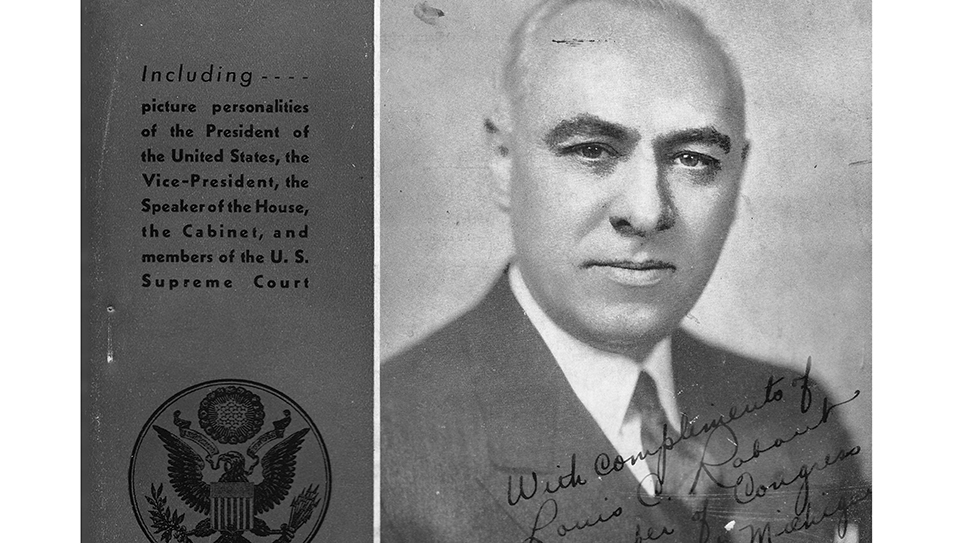There are several stories told about Tennessee’s Senator Kenneth D. McKellar, some of which have become legend. Perhaps the most frequently told story is that of President Franklin Delano Roosevelt asking McKellar if the Tennessean could hide $2 billion in the budget, which was the origin of the Oak Ridge National Laboratory. McKellar’s famous reply was, “Of course I can, but where in Tennessee are we going to hide it?” An older story was that of McKellar having pulled a knife on a colleague while on the Senate floor. That particular story was circulated by national columnist and muckraker Drew Pearson.
As is oftentimes the case with truly excellent stories, it is almost certainly not true.
Senator McKellar surely had a powerful temper and a volatile nature. While Drew Pearson’s allegation that McKellar drew a knife and intended to skewer a colleague was likely not true, it is absolutely true that the Tennessee senator did completely lose his formidable temper on the floor of the United States Senate during an exchange with New York Senator Royal S. Copeland.
The year was 1938 and there were some interesting similarities between the combatants; both McKellar and Copeland were sixty-nine years old at the time. Both men were members of the Delta Kappa Epsilon fraternity and they served together on the Senate Appropriations Committee.
Yet there were significant differences between the two men. Copeland was not apt to displays of ill temper, while Senator McKellar was well known in Washington for his feuds and cantankerousness, especially when provoked. McKellar was one of the more senior members of the Senate, having arrived in 1917. Copeland came to the U. S. Senate in 1923. McKellar had been a successful attorney before his election to Congress in 1911. Copeland had been a physician and was noted for promoting homeopathic cures and herbal medicines at a time when such notions were considered to be little more than quackery. Yet Copeland largely managed to avoid being labeled a quack and wrote columns on medicine, as well as giving regular talks on the radio on the topic.
Senator Copeland was also known for having a fondness for lobbyists. Joseph Alsop, himself a national columnist, once sneered in print that Copeland’s staff would set out trays of sandwiches in the Senate Commerce Committee’s suite of offices for those lobbyists who might be starving. McKellar did not share his colleague’s fondness for lobbyists and was frequently highly suspicious of members of the second oldest profession. Copeland was also a burr under President Roosevelt’s saddle, as the New Yorker was a conservative Democrat. Senator Copeland especially vexed the New Deal administration coming from New York, FDR’s home state, as well as the home state of James A. Farley, Chairman of the Democratic National Committee and Postmaster General. Farley presided over the patronage apparatus during the first eight years of Roosevelt’s administration and the ordinarily genial Irishman plotted to get rid of Copeland in 1934, but the senator was quite popular with New Yorkers. It was a profound embarrassment to Roosevelt and Farley that so conservative a Democrat came from the Empire State.
Alsop conceded McKellar, unlike Royal S. Copeland, was a “violent New Dealer” with a rare ability to produce projects and jobs for Tennessee. Joe Alsop noted, in a short period of time, McKellar had just gotten a new $112 million dam for Tennessee, as well as $1.5 million for a scenic highway and $800,000 for a park and was still laboring to get more for his state.
The nature of the dispute between McKellar and Copeland came during a debate over a bill appropriating money for the War Department. The Senate was debating whether or not to spend $40 million to place anti-aircraft guns along the Eastern seaboard. Considering Royal Copeland represented New York, it is hardly surprising he favored the idea. Senator McKellar didn’t think much of the idea for a variety of reasons, not the least of which the money wasn’t being spent in the State of Tennessee.
Senator McKellar, in the course of his remarks, quoted an army witness as one who “tells the truth.”
Senator Copeland retorted, “It may be that some others tell the truth, too.”
That comment caused Senator McKellar to begin to boil.
“What does the senator mean?” McKellar angrily wanted to know, his face flushing crimson.
“I mean just what I say,” Copeland replied airily.
That did it.
McKellar interpreted Copeland’s comment to infer he was lying.
“I will tell the senator in a moment just what I think of him,” McKellar barked.
Copeland sweetly said, “I hope the senator, before tomorrow morning, will learn the difference between seacoast defenses and anti-aircraft guns.”
McKellar moved toward Copeland’s desk on the floor of the Senate and thundered, “I will not wait until tomorrow morning!”
Senator McKellar, growing increasingly angry, apparently demanded Copeland “step outside” the Senate Chamber so they could resolve their differences. Another version from reporters who witnessed the exchange, claimed McKellar yelled, “Come outside!”, an invitation Copeland ignored. McKellar continued to smolder and when the Senate shortly had concluded its business, the Tennessean was seen to “lunge” at Copeland, but was quickly physically restrained by Senator Bennett Champ Clark of Missouri. McKellar, infuriated, struggled in Clark’s grasp and turned the air blue, screaming that Copeland was a “goddamned asinine old son-of-a-bitch,” as well as a liar. Clark shoved McKellar, still struggling, out of the Senate Chamber.
Some reporters claim McKellar had drawn back his fist to strike Senator Copeland, but was prevented from doing so by the intervention of Bennett Champ Clark and other senators. It certainly would not have been out of character for McKellar, who kept a set of boxing gloves on display in his Senate office, a gift from the Golden Gloves Association who appreciated the fighting nature of the Tennessean.
Senator Copeland told the press he had never called McKellar a liar and said he regretted the misunderstanding. A few months later, Royal S. Copeland was dead, while McKellar would serve another fourteen years in the United States Senate.
Copeland was moldering in his grave by the time Drew Pearson took up the story. Pearson loved baiting the fiery Tennessean and kept an ill-tempered bull on his Maryland farm named “Senator McKellar.” In 1944, Pearson printed a column where he repeated much of the story, but also wrote that McKellar had reached in his pocket for a knife. McKellar did have a penknife on the end of his watch chain, which he wore across his vest, but the knife was tiny, perhaps two inches long. Pearson claimed the details involving the knife were told to him by Bennett Clark, which the Missouri senator later stoutly denied.
Drew Pearson was perhaps the most widely read columnist in the United States at a time when newspapers were numerous and prosperous. Pearson also had his own radio show, which attracted an audience in the millions. Not surprisingly, Pearson was loathed by a number of politicians, including Franklin D. Roosevelt and Harry S. Truman. Senator Joe McCarthy, the Wisconsin demagogue, once physically assaulted Pearson in Washington’s elegant Sulgrave Club. Pearson claimed McCarthy kneed him in the groin and then assaulted him; McCarthy’s own version could be summed up as merely giving the columnist a thorough beating.
Pearson had repeated the knife allegation in a column wherein he detailed the McKellar relatives on his payroll, which was a favorite refrain for the muckraker. Pearson had written his column ostensibly to demolish McKellar’s on-going feud with David Lilienthal, Director of the Tennessee Valley Authority.
McKellar, dressed in black coat, vest and striped trousers, appeared on the Senate floor and announced, “I have been shown an article by one Drew Pearson, a so-called columnist. I wish to read from that article and comment upon it.”
Senator McKellar peered down and read from the offending column, “‘Pearson says: For 32 long years in Congress, blustery mountaineer Kenneth McKellar – – -“
McKellar paused to look around the Senate Chamber and continued his speech.
“I digress long enough to say that I do not know Mr. Pearson, but really he is an ignorant ass, is he not?”
Those senators listening to McKellar roared with laughter.
“I was not born in the mountains,” McKellar told his colleagues. “Yet this ignorant, blundering, lying ass seems to think there is something discreditable about mountains. The truth is that it is not a dishonor to be a mountaineer.”
Thus began McKellar’s furious barrage. It was one of the best of his long career. Even Pearson himself later admitted McKellar had “hit the high watermark for gorgeous invective.”
Senator McKellar then enjoyed himself and entertained his fellow senators by calling the columnist several different kinds of a liar.
“He is just an ignorant liar, a pusillanimous liar, a peewee liar.”
“I understand he and Lilienthal are great friends,” McKellar observed. “They are two of a kind. What is fitter than two liars standing up for each other?”
McKellar addressed, point-by-point, several of Pearson’s offenses and then cried, “Listen to this. Of all the remarkable statements that have been made about me in this article, this one is the most false, most damnable, most outrageous, the most colossal lie I have ever read about myself or anyone else: ‘They remember the occasion when McKellar pulled a knife, and charged a colleague on the Senate floor, until he was disarmed.’”
Senator McKellar roared, “I say that statement is a willful, deliberate, malicious dishonest, intensely cowardly, low, degrading, filthy lie…”
McKellar went on to say, “I have never pulled a knife on any person in my life. Not only have I never pulled a knife on any senator, but I have never pulled a knife on anyone in my entire history.”
Pearson claimed that at that point in his speech, Senator McKellar “glared hard” at Bennett Champ Clark of Missouri. Senator Clark rose from his seat and asked if McKellar would yield the floor. Senator McKellar said, “Not withstanding my temper, I am delighted to yield.”
Clark immediately told the Senate that McKellar had “never been intemperate with me.”
Pearson fretted and printed that Clark had been the source of his claim that McKellar had reached in a pocket for a “clasp knife,” with which he doubtless intended to carve up Royal S. Copeland. McKellar reached new heights in denouncing the columnist.
“When a man is a natural born liar, a liar during his manhood and all the time, a congenital liar, a liar by profession, a liar for a living, a liar in the daytime, and a liar in the nighttime, it is remarkable how he can lie.”
The senators, thoroughly enjoying McKellar’s performance, rocked with mirth and laughter.
Senator A. B. “Happy” Chandler of Kentucky got to his feet and noted, “I believe there is a definition for that sort of liar. He is called a revolving liar.”
McKellar savored the phrase instantly.
“A revolving liar” he exulted. “It suits Pearson exactly!”
Senator McKellar demanded to know if any senator would attest to Pearson’s claim that they feared him and his power as chairman of the Senate’s Appropriations Committee. Not a single senator uttered a peep. McKellar concluded his performance by saying he hoped if he had “been guilty of exhibition of temper” they would forgive him. Virtually every member of the United States Senate liked Pearson no better than McKellar and his colleagues were happy to see the Tennessean give the columnist hell.
Despite his penchant for hectoring Senator McKellar about relatives and nepotism, according to Arthur Schlesinger, Drew Pearson thought Robert F. Kennedy would “make a whale of an Attorney General”. Pearson did advise RFK not to accept an appointment as Attorney General from his brother, not on the grounds of nepotism, but rather because “your brother in the White House would be in hot water all the time.”
Doubtless, Senator McKellar would have had something colorful to say about that.







